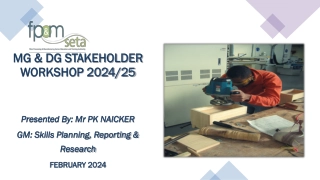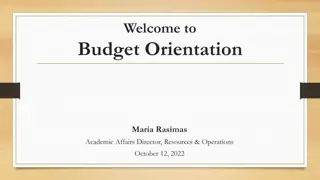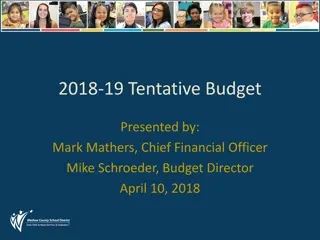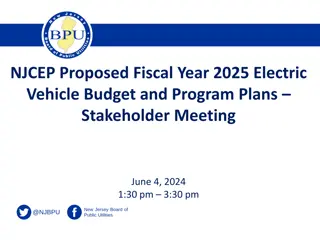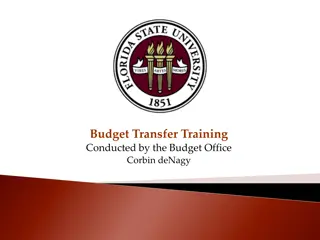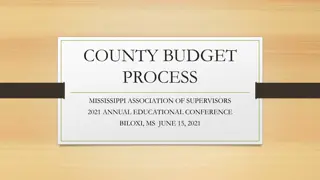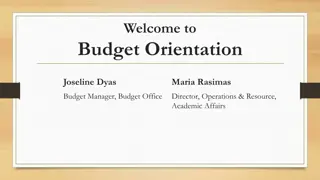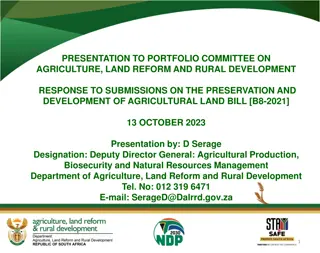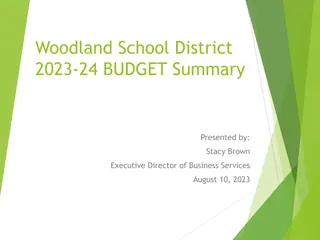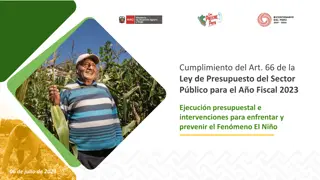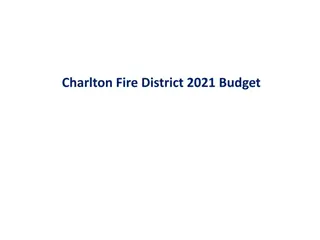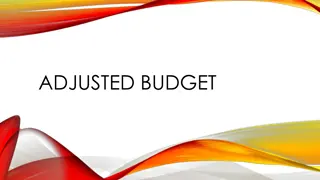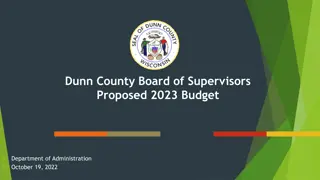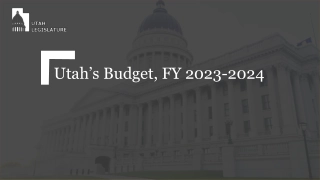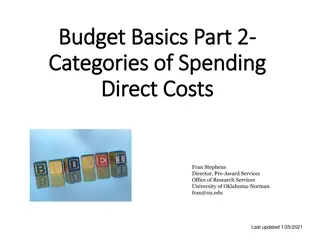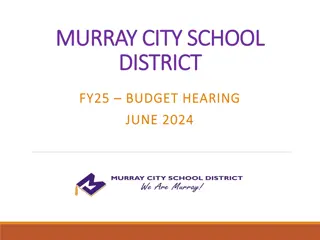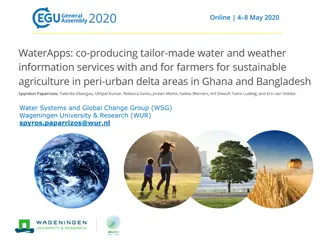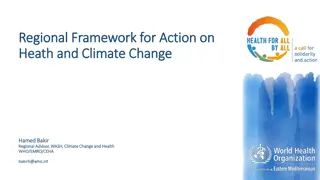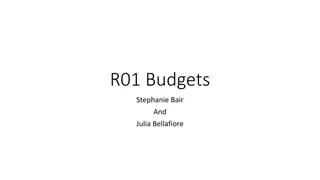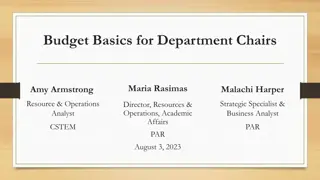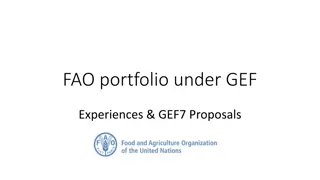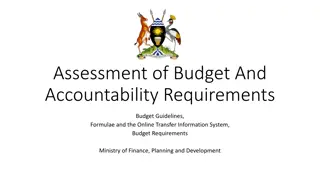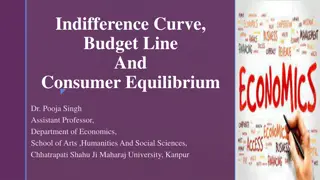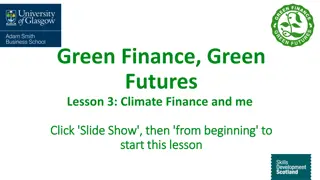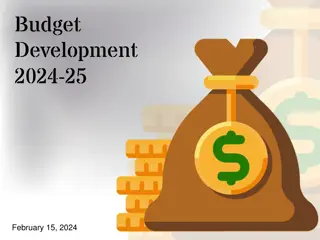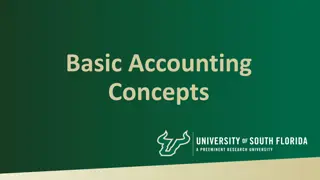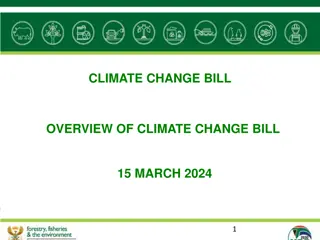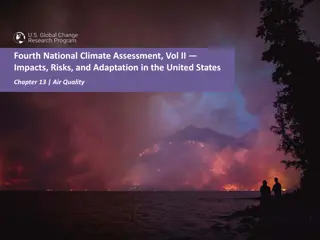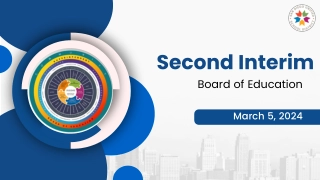Environment and Climate Budget Summary and Stakeholder Submissions
The Ministry of Environment, Climate, and Tourism's efforts in conservation and budget allocations for 2023 and 2024 are highlighted. Concerns include resource limitations affecting service delivery and calls for increased funding for climate change programs and stakeholder consultations on key bills. Stakeholders emphasize equitable climate action and advocate for expanded departmental reach and carbon tax implementation.
Download Presentation

Please find below an Image/Link to download the presentation.
The content on the website is provided AS IS for your information and personal use only. It may not be sold, licensed, or shared on other websites without obtaining consent from the author. Download presentation by click this link. If you encounter any issues during the download, it is possible that the publisher has removed the file from their server.
E N D
Presentation Transcript
SUBMISSIONS FROM THE MINISTRY OF ENVIRONMENT, CLIMATE AND TOURISM The Committee notes and acknowledges the following; I. The Ministry s efforts to conserve our environment through combating the unsustainable exploitation of our natural resources. II. The Ministry s achievements in the 2023 budget that include the roll out of the declared state of disaster on emergency solid waste management. III. The depleted staff complement within the Ministry as a result of public sector employment limitations. IV. The inadequate tools of trade that compromise on service delivery. V. Insufficient public sector support on seasonal hazards and disaster risk reduction.
SUBMISSIONS FROM THE MINISTRY OF ENVIRONMENT, CLIMATE AND TOURISM (Cont) I. The outstanding treasury allocation amounting to ZW$300 million for wetlands rehabilitation and restoration that has recently been released eroded by inflation. II. The outstanding 2023 treasury allocation balance amounting to ZW$500 million from the revised budget. III. The absence of funding resources for the department of Gender, Mainstreaming and Inclusivity as well as the department of Strategic Policy Planning and M&E. This omission tends to allow the payment of salaries to employees without the means to deliver the programme s mandate.
THE MINISTRY OF ENVIRONMENT, CLIMATE AND WILDLIFE 2024 BUDGET SUMMARY IDEAL BUDGET BUDGET ALLOCATION % ALLOCATION Total Budget ZW$404.6 Bn ZW$77. 572 Bn 19.2 Programme 1 Policy and admin ZW$100.2 Bn ZW$18.1 Bn 18 Programme 2 Env, Nat. Resources and Wildlife Management ZW$235.3 Bn ZW$35. 4 Bn 15.1 Programme 3 Weather, Climate and Seismology ZW$69. 133Bn ZW$14.519Bn 21
STAKEHOLDER SUBMISSIONS TO THE COMMITTEE Stakeholders opined that climate change is a threat multiplier affecting vulnerable groups of our communities. They advocated for a budget allocation that was alive to realities such as equitable climate action reflected through our adaptation, mitigation and just transition measures. Stakeholders called on the government through the Ministry to set aside enough financial resources to afford wider stakeholder consultations on the upcoming Climate Change Bill, the Environmental Management Amendment Bill and other Bills. Stakeholders submitted that funds should be set aside for the development, implementation, monitoring and evaluation of legal and policy frameworks that are responsive for adverse effects of climate change.
STAKEHOLDER SUBMISSIONS TO THE COMMITTEE Stakeholders called on the committee to advocate for a sufficient budget allocation to the Ministry of Environment so that the Climate Change Management Department can decentralize its offices to the district level. They advocated for carbon tax to be utilized for intended purposes. The Stakeholders called for the establishment of an environmental rehabilitation fund through the upcoming Mines and Minerals Amendment Bill.
DOMESTIC RESOURCE MOBILISATION MEASURES, OBSERVATIONS AND RECOMMENDATIONS FROM THE COMMITTEE Despite the budget that falls short of the Ministry s needs, we should bear in mind that the nation needs to balance economic transformation and environmental management. Thus, the Committee is aware that the national budget cannot be grown enough to cover all the Ministry s bids and recommends as follows;
PARKS AND WILDLIFE MANAGEMENT AUTHORITY OF ZIMBABWE i. The Committee notes that ZIMPARKS tourist facilities are very vital sources of revenue for tourism and business development. ii. These facilities require funding and urgent renovation to improve the quality of the guest rooms. There is need to also improve access to these tourist facilities in National Parks. iii. Once this has been done Treasury should develop a guiding policy that allows the Authority to charge market based prices or apply cost recovery tariffs to cover its budgetary deficit and be on its way to self-sustenance. Treasury has provided 9.9% of its ideal budget.
ENVIRONMENTAL MANAGEMENT AGENCY According to section 46 (e) of the Environmental Management Act [Chapter 20:27], proceeds from Carbon Tax collected in terms of the Twenty-Eighth Schedule to the Income Tax Act [Chapter 23:06] should be allocated to EMA to finance pollution based priority areas. This obligation has never been honoured. EMA should not make a request for Carbon Tax because it is one of the Agency s statutory funds. It can help in procuring air monitoring equipment, automated water monitoring and decentralisation of its laboratories and better still the construction of a hazardous landfill.
ENVIRONMENTAL MANAGEMENT AGENCY The Ministry of Finance and Economic Investment should explain and convince the Committee why the Mining levy is always defended and not collected yet it is a source of revenue to restore our degraded environment. In order to enhance the collection of revenue from fees or charges for services rendered by or received from the Agency, treasury should direct government departments that are not paying EIA fees to play their part. This includes local authorities and government hospitals that are not paying environmental levies. Treasury should also allow the Agency to match its EIA fees for trans-boundary projects with other countries. Treasury has availed only 13% of its ideal budget.
FORESTRY COMMISSION The Committee opines that capital injection from Treasury to rehabilitate the infrastructure (hunting and photographic safaris and the procurement of the equipment) guarantees 100% revenue collection from the Forestry Commission. Treasury should timeously avail the resources from Afforestation Fund established in terms of section 18 of the Public Finance Management Act [Chapter 22:19] for the Afforestation and re-forestation activities or Tobacco Wood Energy Programme (TWEP). TWEP is being collected from tobacco farmers and remitted to Treasury through ZIMRA. The Commission should augment its revenue through safari operators lease payments, timber revenue sources, Lease fees and dividend from Allied Timbers and other regulatory fees and fines.
FORESTRY COMMISSION The Committee observed that though the Forestry Commission is now mandated through the Forest Amendment Act to regulate and manage veld fires, there is no funding from Treasury for capacitation on this issue. The Committee recommends that Treasury should avail funding earmarked for this important priority activity. Treasury has allocated 27% of the Commission s ideal budget.
WEATHER, CLIMATE AND SEISMOLOGY PROGRAMME The Committee observed that there are currently no existing revenue generation measures to sustain this programme yet it is very crucial. The Met Department owes Cobra security company, ZINWA, ZESA, and Telone a total of ZW$14million. Thus, the amount that will be disbursed will be used to pay the debt. The Committee is concerned that treasury hasn t paid for projects equipment tendered in 2022 financial year, ( These are Automatic Weather and Observation System, Automatic Weather Station and Digital Stations amounting ZW$1.6 Bn) including Radar project amounting to ZW$700 000. Treasury should avail adequate funding for this programme to enable the relevant department to procure off-road vehicles for field work, to resuscitate upper air stations for upper air observation as well as procuring the necessary consumables. This programme should be prioritised because it anchors climate change mainstreaming activities, adaptation interventions, delivery of the country s climate change commitments, co-financing and the payment of outstanding international subscriptions.
THE MINISTRY OF TOURISM AND HOSPITALITY INDUSTRY 2024 BUDGET SUMMARY IDEAL BUDGET BUDGET ALLOCATION % ALLOCATION Total Budget ZW$438 Bn ZW$50.7 Bn 11.5 Programme 1 ZW$101.7 Bn Policy and Admin Programme 2 ZW$15.5 Bn ZW$41.3 Bn 19.2 Tourism Promotion Programme 3 ZW$97.5 Bn Tourism Development Programme 4 ZW$223.3Bn ZW$9.4Bn 4.2 Grant support for ZTA and MOTDC
ZIMBABWE TOURISM AUTHORITY Existing sources of revenue from ZTA include; i. Tourism Levy ii. Annual Registration/Licensing Fees contributing 6% of ZTA s revenue iii. Government Grant complimenting ZTA revenue streams iv. Automation of business processes to enhance revenue mobilisation, registration and levy compliance enforcement v. The Tourism Revolving Fund throughrecapitalization and investment in the Tourism Sector NB: At best these revenue sources are not adequate for its self-sustenance
ZIMBABWE TOURISM AUTHORITY The creation of a new Ministry requires new, focused and well funded strategies to boost the performance of the sector according to international best practices The Committee observed that Treasury allocation for the Ministry does not recognise the 4.25% contribution of the Tourism sector to the GDP nor its 2% employment contribution. Furthermore, the budget allocation is not cognisant of the essence of targeting domestic, regional and international markets in terms of tourism development and promotion. The budget allocation negates the devolution thrust embraced by the Ministry within all the ten provinces.
ZIMBABWE TOURISM AUTHORITY The new Ministry is critically short-staffed, without a centrally dedicated office accommodation and severely under resourced in terms of the tools of trade. Tourism promotion plays a crucial role in the engaging and re-engaging drive but without adequate funding it will be extremely difficult to deal with destination management. There should be sufficient funding to bid to host major tourism conferences. The country needs to be a stand alone destination and not be packaged with other destinations.
ZIMBABWE TOURISM AUTHORITY The Budget allocation towards tourism promotion shows a fatal omission and disregard the timing of contracts signing where the industry works two years in advance. Thus, contracts for the year 2025/2026 are signed in 2023 and prices for these years will be in brochures already in travel agencies in every feeder market following trade across the globe. Bookings will already be in the system, based on contractual obligations with tour operators, airlines and agents. This is basically why the Committee supports the presence of tourism attach s in both major and emerging markets but without the requisite financial resources, our tourism continues to lag behind. Treasury should increase the budget allocations for the Ministry so that it acquires stands for mixed-use development such as Tourism Villages where operators and regulators are house at one place.
ZIMBABWE TOURISM AUTHORITY The Authority has a huge task to adapt, explore new and innovative ways of reviving, growing and developing our tourism and achieve a US$5 Billion Tourism Economy by 2025 Committee recommends for budgetary support that meets domestic and international marketing campaigns. International marketing demands huge foreign currency allocations


